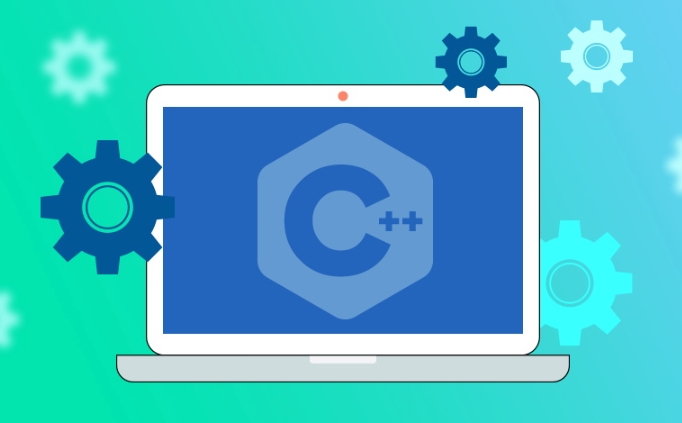When recording logs in C applications, you should select the appropriate library and configure it reasonably. It is recommended to use third-party libraries such as spdlog, glog or Boost.Log. Among them, spdlog is suitable for most projects because it is lightweight, easy to use and high performance. The log level needs to be clearly distinguished between debug, info, warning, and error, and set output levels according to the environment. If debug is enabled in the development stage, only warning and error are retained in the production environment. Log output targets should not be limited to the console only. It is recommended to write files or output to the console and files at the same time. Spdlog's basic_logger_mt or rotating_logger_mt can be implemented, and file size limitations and scrolling strategies can be set; the log format should contain timestamps, levels, logger names and other information, and can be customized through set_pattern. When there are many modules, independent logger names should be assigned to each module to improve problem positioning efficiency.

When doing logging in C applications, the key is to choose the right tool and structure to output it. You don't need to build wheels from scratch, but you need to know how to organize information, control levels, and write to target locations.

What library should I use? Don't write basic functions yourself
The C standard library does not have a built-in logging system, so most projects will introduce third-party libraries to handle. Commonly used are:

- spdlog : a lightweight, high-performance log library based on fmt, supports asynchronous, file scrolling, etc.
- glog (Google Log) : It is rich in features and is suitable for large projects, but the configuration is slightly complicated.
- Boost.Log : Powerful but dependent on Boost, the compilation time may become longer.
If you just want to add an INFO quickly, then spdlog is a good choice. It is simple to install, has clear APIs, and has little dependence on external components.
Log levels should be clearly distinguished, don't just use info
A good logging system should support multiple log levels, such as debug, info, warning, and error. These levels help you filter information in different environments:

- You can open the debug output during the development stage and see the process details
- Only warning and error are retained after going online to reduce interference
Take spdlog as an example, you can use it like this:
auto logger = spdlog::get("my_logger");
logger->debug("This is a debug message");
logger->info("This is an info message");
logger->warn("Something might be wrong");
logger->error("An error occurred");Setting the global log level is also very convenient:
spdlog::set_level(spdlog::level::warn); // Only warn and above are displayed
Where is the log output? Don't just hit the console
By default, many log libraries will be output to the terminal, but in practical applications, you usually want to write the logs to a file, or to both the console and the file.
For example, use spdlog to create a logger to write to a file:
auto file_logger = spdlog::basic_logger_mt("file_logger", "logs/basic.txt");
file_logger->info("Logged to file");You can also create multi-target loggers, such as a logger that outputs both to the terminal and writes to files:
auto console_logger = spdlog::stdout_color_mt("console");
auto file_logger = spdlog::basic_logger_mt("file", "app.log");
// Merge output can be done by spdlog::sinks::tee or manually calling multiple loggers In addition, remember to set the size limit and scrolling strategy of the log file to avoid the disk being full. For example, use rotating_file_sink :
auto rotating_logger = spdlog::rotating_logger_mt("rotating", "logs/rotating.txt", 1024 * 1024 * 5, 3);The above line of code means that each log file is up to 5MB and a maximum of 3 backups are retained.
Don't ignore log formats and naming
Adding timestamps to logs, log levels, and logger names can make it easier for you to locate problems. The default format may be too simple, so it is recommended to customize it:
spdlog::set_pattern("[%Y-%m-%d %H:%M:%S] [%^%l%$] %v");The output looks like this:
[2025-04-05 14:20:00] [INFO] Application started
If the project is large and there are many modules, it is best to assign a different logger name to each module, such as "network" , "database" , "ui" , etc., so that when troubleshooting the problem, you can see which part of the problem is at a glance.
Basically that's it. Make good use of the log library, set the levels and output methods reasonably, and add clear naming and formatting, your C application will have good logging capabilities.
The above is the detailed content of How to do logging in a C application?. For more information, please follow other related articles on the PHP Chinese website!

Hot AI Tools

Undress AI Tool
Undress images for free

Undresser.AI Undress
AI-powered app for creating realistic nude photos

AI Clothes Remover
Online AI tool for removing clothes from photos.

Clothoff.io
AI clothes remover

Video Face Swap
Swap faces in any video effortlessly with our completely free AI face swap tool!

Hot Article

Hot Tools

Notepad++7.3.1
Easy-to-use and free code editor

SublimeText3 Chinese version
Chinese version, very easy to use

Zend Studio 13.0.1
Powerful PHP integrated development environment

Dreamweaver CS6
Visual web development tools

SublimeText3 Mac version
God-level code editing software (SublimeText3)
 C vector get first element
Jul 25, 2025 am 12:35 AM
C vector get first element
Jul 25, 2025 am 12:35 AM
There are four common methods to obtain the first element of std::vector: 1. Use the front() method to ensure that the vector is not empty, has clear semantics and is recommended for daily use; 2. Use the subscript [0], and it also needs to be judged empty, with the performance comparable to front() but slightly weaker semantics; 3. Use *begin(), which is suitable for generic programming and STL algorithms; 4. Use at(0), without manually null judgment, but low performance, and throw exceptions when crossing the boundary, which is suitable for debugging or exception handling; the best practice is to call empty() first to check whether it is empty, and then use the front() method to obtain the first element to avoid undefined behavior.
 How to develop AI-based text summary with PHP Quick Refining Technology
Jul 25, 2025 pm 05:57 PM
How to develop AI-based text summary with PHP Quick Refining Technology
Jul 25, 2025 pm 05:57 PM
The core of PHP's development of AI text summary is to call external AI service APIs (such as OpenAI, HuggingFace) as a coordinator to realize text preprocessing, API requests, response analysis and result display; 2. The limitation is that the computing performance is weak and the AI ecosystem is weak. The response strategy is to leverage APIs, service decoupling and asynchronous processing; 3. Model selection needs to weigh summary quality, cost, delay, concurrency, data privacy, and abstract models such as GPT or BART/T5 are recommended; 4. Performance optimization includes cache, asynchronous queues, batch processing and nearby area selection. Error processing needs to cover current limit retry, network timeout, key security, input verification and logging to ensure the stable and efficient operation of the system.
 C bit manipulation example
Jul 25, 2025 am 02:33 AM
C bit manipulation example
Jul 25, 2025 am 02:33 AM
Bit operation can efficiently implement the underlying operation of integers, 1. Check whether the i-th bit is 1: Use n&(1
 C Standard Library Explained
Jul 25, 2025 am 02:11 AM
C Standard Library Explained
Jul 25, 2025 am 02:11 AM
The C standard library helps developers improve code quality by providing efficient tools. 1. STL containers should be selected according to the scene, such as vector suitable for continuous storage, list suitable for frequent insertion and deletion, and unordered_map is suitable for fast search; 2. Standard library algorithms such as sort, find, and transform can improve efficiency and reduce errors; 3. Intelligent pointers unique_ptr and shared_ptr effectively manage memory to avoid leakage; 4. Other tools such as optional, variant, and function enhance code security and expressiveness. Mastering these core functions can significantly optimize development efficiency and code quality.
 C function example
Jul 27, 2025 am 01:21 AM
C function example
Jul 27, 2025 am 01:21 AM
Functions are the basic unit of organizing code in C, used to realize code reuse and modularization; 1. Functions are created through declarations and definitions, such as intadd(inta,intb) returns the sum of the two numbers; 2. Pass parameters when calling the function, and return the result of the corresponding type after the function is executed; 3. The function without return value uses void as the return type, such as voidgreet(stringname) for outputting greeting information; 4. Using functions can improve code readability, avoid duplication and facilitate maintenance, which is the basic concept of C programming.
 Understanding the C ABI
Jul 24, 2025 am 01:23 AM
Understanding the C ABI
Jul 24, 2025 am 01:23 AM
C ABI is the underlying rule that the compiler follows when generating binary code, which determines mechanisms such as function calls, object layout, name adaptation, etc. 1. It ensures that different compilation units interact correctly, 2. Different compilers or versions may adopt different ABIs, affecting dynamic library links, STL transfers, virtual function calls, etc. 3. Cross-platform development, long-term system maintenance, third-party library use and other scenarios need to pay special attention to ABI consistency, 4. ABI can be controlled through macro definitions and compilation options, and use tools to view the symbol table to judge consistency.
 C std::is_same example
Jul 24, 2025 am 03:22 AM
C std::is_same example
Jul 24, 2025 am 03:22 AM
std::is_same is used to determine whether the two types are exactly the same at compile time and return a bool value. 1. In the basic usage, std::is_same::value is true when T and U are exactly the same, otherwise it is false. Different modifiers such as const, reference, pointer, etc. will cause false; 2. You can remove the type modification with std::remove_const, std::remove_reference and other types, and then compare it to achieve more flexible type judgment; 3. It is often used in template metaprogramming in practical applications, such as conditional compilation with ifconstexpr, and perform different logic according to different types; 4.
 C decltype example
Jul 27, 2025 am 01:32 AM
C decltype example
Jul 27, 2025 am 01:32 AM
decltype is a keyword used by C 11 to deduce expression types at compile time. The derivation results are accurate and do not perform type conversion. 1. decltype(expression) only analyzes types and does not calculate expressions; 2. Deduce the variable name decltype(x) as a declaration type, while decltype((x)) is deduced as x due to lvalue expression; 3. It is often used in templates to deduce the return value through tail-set return type auto-> decltype(t u); 4. Complex type declarations can be simplified in combination with auto, such as decltype(vec.begin())it=vec.begin(); 5. Avoid hard-coded classes in templates






